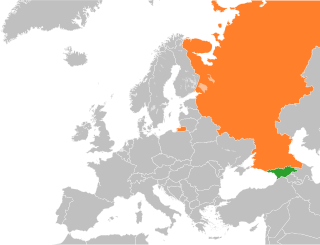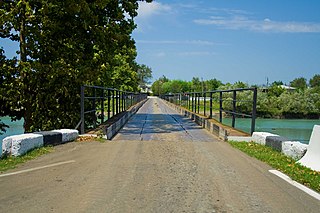
The United Nations Observer Mission in Georgia (UNOMIG) was established by United Nations Security Council Resolution 858 in August 1993 to verify compliance with a 27 July 1993 ceasefire agreement between the Republic of Georgia and forces in Abkhazia with special attention given to the situation in the city of Sukhumi, Georgia. It was also to investigate reports of ceasefire violations, attempt to resolve such incidents with the parties involved, and to report to the Secretary-General of the United Nations on the implementation of its mandate. 88 military advisors were authorized to be deployed to the region. It ended on 15 June 2009, when Russia vetoed an extension of the mission. The last observers left the region on 15 July 2009.
The Kodori Valley, also known as the Kodori Gorge, is a river valley in Abkhazia, Georgia's breakaway autonomous republic. The valley's upper part, populated by Svans, was the only corner of the post-1993 Abkhazia directly controlled by the central Georgian government, which since 2006 officially styles the area as Upper Abkhazia. On August 12, 2008, Russo–Abkhazian forces gained control of the Upper Kodori Valley, previously controlled by Georgia.

The Abkhaz–Georgian conflict involves ethnic conflict between Georgians and the Abkhaz people in Abkhazia, a de facto independent, partially recognized republic. In a broader sense, one can view the Georgian–Abkhaz conflict as part of a geopolitical conflict in the Caucasus region, intensified at the end of the 20th century with the dissolution of the Soviet Union in 1991.
The 2006 Kodori crisis erupted in late July 2006 in Abkhazia's Kodori Gorge, when a local militia leader declared his opposition to the Government of Georgia, which sent police forces to disarm the rebels. The upper part of the Kodori Gorge was at that time the only portion of Abkhazia, Georgia's breakaway republic, not controlled by the Abkhaz authorities.

Russia and Georgia have had relations for centuries. The contacts between the two date back to the 15th and 16th centuries, and the most important stage started in 1580s, when Georgian kingdom of Kakheti and Russian Empire signed a treaty of alliance in 1587. Since then, Georgia-Russia relations have been developing vibrantly, and culminated in Treaty of Georgievsk, which established eastern Georgia as a protectorate of Russia. At that time, Georgia saw Russia as a powerful Christian and modernizing neighbor, capable of protecting Georgia from invading Muslim empires and North Caucasian raiders. Although Russia did help Georgia to ward off Lezgin invasions, it failed to protect Georgia when Persia invaded in 1795. Catherine the Great later imposed punitive measures against Persia, but they were cut short by her death. In 1800, Paul signed a proclamation on the incorporation of eastern Georgia into the Russian Empire, which was finalized the following year by Tsar Alexander I. This was followed by annexation by Russia of western Georgian kingdoms and principalities and their incorporation into Russian Empire, namely, Kingdom of Imereti in 1810, Principality of Guria in 1829, Principality of Svaneti in 1858 and Principality of Mingrelia in 1867. Incorporation into the empire ended Muslim invasions and brought peace to Georgia. Russian Empire ended slave trade by Ottomans in western Georgia, which saved Georgia's shrinking population from demographic catastrophe. It also provided Georia with means for a cultural revival, such as Tiflis Imperial Theater, which was opened in 1852 and revitalized Georgia's long-abandoned theatrical tradition. Georgian intellectuals pursued their education in universities of Moscow and Saint Petersburg and brought new ideas to Georgia. However, loss of sovereignty and abolition of the autocephalous status of the Georgian Orthodox Church, along with Russification policy, gave rise to public discontent and rebellions. As a result of Russo-Turkish wars of 1828-1829 and 1877-1878, Russia acquired the historical southern Georgian provinces, such as Adjara and Meskheti from the Ottomans. The unification of historical Georgian lands under Russian Empire and national consolidation of Georgia gave rise to Georgian nationalism, spearheaded by "Tergdaleulebi" movement, a group of Russian-educated Georgian intellectuals led by Ilia Chavchavadze who brought modern nationalist ideas into Georgia. They campaigned against Russification and promoted national identity among Georgians through "Society for the Spreading of Literacy among Georgians" and newspaper Iveria. Their vision did not envisage an outright revolt for independence, but demanded autonomy within the reformed Russian Empire, with greater cultural freedom, promotion of the Georgian language, and support for Georgian educational institutions and the national church. This movement instilled strong sense of national cohesiveness among Georgians, which were divided between various Georgian regional feudal kingdoms and Muslim empires throughout middle ages, and paved the path to the independence, which Georgia regained following the collapse of Russian Empire in 1917. The Menshevik government of Georgia transformed the image of now Bolshevik-led Russia from a source of enlightment into Asiatic state imbued with oriental backwardness and sough ties with the West through its links to Second International. The short-lived Georgian independence ended when Georgia was incorporated in the Soviet Union as the Georgian Soviet Socialist Republic in 1922. The bilateral Russo-Georgian ties were strained again in 1991 due to Moscow's support of separatist regions within Georgia and its intentions to join NATO. Russo-Georgian relations briefly began to improve during the Shevardnadze's presidency, but they became strained again after the Rose Revolution in Georgia. The tensions led to the Russo-Georgian War in August 2008, and diplomatic relations were broken. To this day, the two countries have maintained no formal diplomatic relations since.

The 2007 Georgia helicopter incident refers to the accusation by Georgia that three Russian helicopters fired on the Kodori Gorge in Abkhazia on March 11, 2007. It was a break-away autonomous republic in north-western Georgia The attack was at the village of Chkhalta, which damaged a school, and the government headquarters of the Georgian-backed Abkhaz government-in-exile. Russia denied any attacks and said all its aircraft near the area were grounded over the weekend.
The 2007 Bokhundjara incident refers to a skirmish that occurred between Georgia and its breakaway republic of Abkhazia near the border with Georgia proper in Abkhazia Tkvarcheli District on September 20, 2007, between Georgian Interior Ministry commandos and Abkhaz forces. The United Nations Observer Mission in Georgia (UNOMIG) launched an independent investigation of the incident. On October 11, 2007, it released a progress report, confirming the incident took place on Abkhaz-controlled territory at the foot of Mount Bokhundjara, thus confirming the Abkhaz version of the event. On October 27, 2007, Georgia released the arrested Abkhazians and handed them over to the U.N. observers as a "sign of good will."
2008 Georgian drone shootdowns refers to several incidents in March, April and May 2008, when Georgia's pro-Russian breakaway region of Abkhazia claimed to have shot down unmanned Georgian reconnaissance aircraft. Georgia initially denied that any of these downings took place, but made the allegations public following the April 20 shootdown carried out by a fighter jet belonging to the Russian Air Force. Involvement of the Russian military was denied by the Abkhaz separatists and Russia, with both falsely claiming that the separatists alone had accomplished the task. However, Russian military involvement was later confirmed by a UNOMIG fact finding mission which represented its results on May 26. On June 1, in a note sent to the Russian delegation at the Organization for Security and Co-operation in Europe (OSCE), Georgia recognised that two other downings of its drones had taken place in the past.

The Battle of the Kodori Valley was a military operation during the Russo-Georgian War in the Upper Kodori Valley of Abkhazia, a breakaway region of Georgia. It was the only part of Abkhazia under Georgian control before this military conflict. On 9 August 2008, the Abkhaz military, with support by Russian forces, launched an operation to remove the remaining Georgian troops from the disputed gorge. After three days, the Georgian military left the Upper Kodori Valley.

Abkhazia, officially the Republic of Abkhazia, is a partially recognised state in the South Caucasus, on the eastern coast of the Black Sea, at the intersection of Eastern Europe and Western Asia. It covers 8,665 square kilometres (3,346 sq mi) and has a population of around 245,000. Its capital and largest city is Sukhumi.
The 2008 Khurcha incident refers to the May 21, 2008 attack on two minibuses in the Georgian village of Khurcha, near the ceasefire line with the internationally unrecognised Republic of Abkhazia. The buses were carrying Georgians on the way to vote at the parliamentary election which was underway that day. 3 people were injured. During the high profile TV coverage later that day, and while voting booths were open, Georgian officials claimed that the attack was carried out by Abkhaz forces. Several investigations later showed that the incident was most likely staged by unknown Georgian servicemen.

Ganarjiis Mukhuri is a village in the Samegrelo-Zemo Svaneti region of western Georgia, in the Zugdidi municipality. It is situated at the border with Abkhazia and the city of Zugdidi. The village area is located by the Black Sea and on the right bank of the Enguri River, with the village center six kilometers from the sea. Within the administrative division of the municipality, Ganmukhuri is not part of a community, but is an so called independent village.
United Nations Security Council resolution 1393, adopted unanimously on 31 January 2002, after reaffirming all resolutions on Abkhazia and Georgia, particularly Resolution 1364 (2001), the Council extended the mandate of the United Nations Observer Mission in Georgia (UNOMIG) until 31 July 2002.

United Nations Security Council resolution 1427, adopted unanimously on 29 July 2002, after reaffirming all resolutions on Abkhazia and Georgia, particularly Resolution 1393 (2002), the Council extended the mandate of the United Nations Observer Mission in Georgia (UNOMIG) until 31 January 2003.
United Nations Security Council resolution 1462, adopted unanimously on 30 January 2003, after reaffirming all resolutions on Abkhazia and Georgia, particularly Resolution 1427 (2002), the council extended the mandate of the United Nations Observer Mission in Georgia (UNOMIG) until 31 July 2003.

United Nations Security Council resolution 1494, adopted unanimously on 30 July 2003, after reaffirming all resolutions on Abkhazia and Georgia, particularly Resolution 1462 (2003), the Council extended the mandate of the United Nations Observer Mission in Georgia (UNOMIG) until 31 January 2004 and endorsed the establishment of a police component.
United Nations Security Council resolution 1524, adopted unanimously on 30 January 2004, after reaffirming all resolutions on Abkhazia and Georgia, particularly Resolution 1494 (2003), the council extended the mandate of the United Nations Observer Mission in Georgia (UNOMIG) until 31 July 2004.
United Nations Security Council resolution 1554, adopted unanimously on 29 July 2004, after reaffirming all resolutions on Abkhazia and Georgia, particularly Resolution 1524 (2004), the council extended the mandate of the United Nations Observer Mission in Georgia (UNOMIG) until 31 January 2005.

United Nations Security Council resolution 1615, adopted unanimously on 29 July 2005, after reaffirming all resolutions on Abkhazia and Georgia, particularly Resolution 1582 (2005), the council extended the mandate of the United Nations Observer Mission in Georgia (UNOMIG) until 31 January 2006.

United Nations Security Council Resolution 1716, adopted unanimously on October 13, 2006, after reaffirming all resolutions on Abkhazia and Georgia, particularly Resolution 1666 (2006), the Council extended the mandate of the United Nations Observer Mission in Georgia (UNOMIG) until April 15, 2007.







